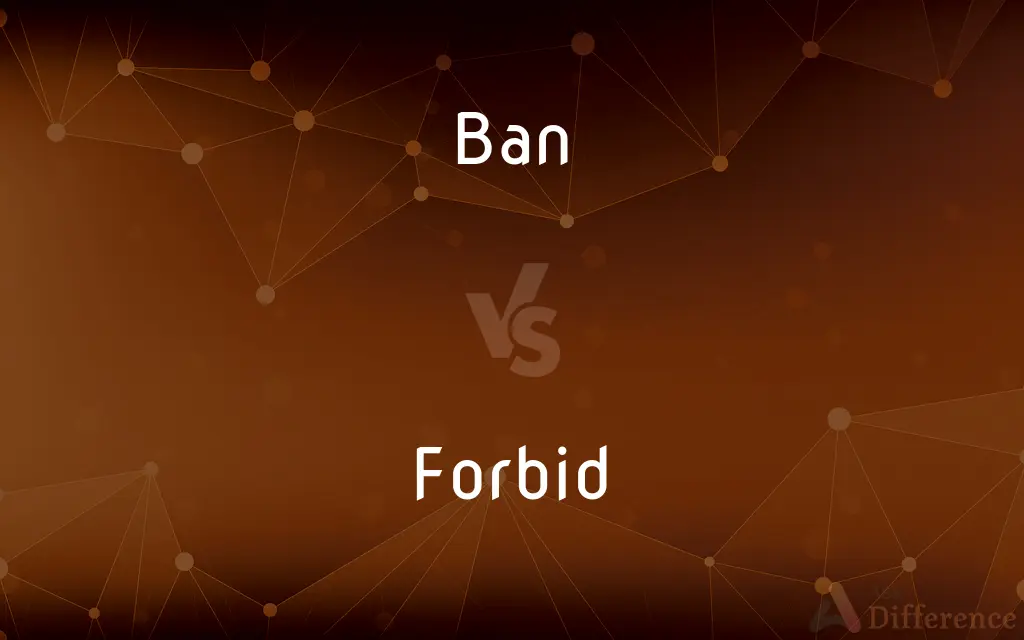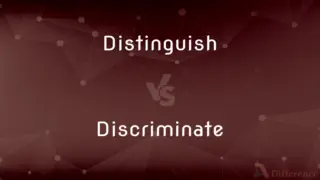Ban vs. Forbid — What's the Difference?
Edited by Tayyaba Rehman — By Maham Liaqat — Updated on April 9, 2024
Ban implies a formal prohibition by authority; forbid is a broader term denoting any prohibition.

Difference Between Ban and Forbid
Table of Contents
ADVERTISEMENT
Key Differences
Ban usually refers to an official or legal prohibition, often made by a governing body or institution, and typically applies to specific actions, items, or behaviors. For example, a government may ban smoking in public places, implying legal consequences for violations. On the other hand, forbid is a more general term that encompasses any act of prohibiting something, not necessarily through formal or legal means. It can be used in both personal and official contexts, such as a parent forbidding a child from staying out late.
While bans often come with specified penalties or legal ramifications for non-compliance, the consequences of disobeying a forbiddance can vary widely depending on the authority and context. For instance, an employer might forbid employees from using social media during work hours, with violations possibly leading to disciplinary action but not legal consequences.
Bans are typically enacted through formal processes and are publicized to ensure awareness among those affected. Forbidding something, however, can be as simple as a verbal instruction or agreement, without the need for formal documentation or public announcement. This distinction highlights the varying levels of formality and enforcement between the two.
In terms of scope, bans are often more specific and targeted, aimed at preventing particular behaviors or activities within a defined area or community. Forbidding, while it can also be specific, allows for a broader application, ranging from personal preferences to universal prohibitions, such as cultural or religious taboos.
The choice between using "ban" and "forbid" depends on the context and the speaker's intent. Using "ban" emphasizes the formal and often public nature of the prohibition, while "forbid" conveys a prohibition that could be either formal or informal, personal or public, highlighting its versatility in different contexts.
ADVERTISEMENT
Comparison Chart
Nature
Formal prohibition, often legal.
General prohibition, not necessarily formal or legal.
Authority
Typically by governing bodies or institutions.
Can be by anyone in a position to prohibit.
Penalties
Often has specified legal consequences.
Consequences vary widely, not always legal.
Process
Enacted through formal processes.
Can be informal, like verbal instructions.
Scope
Specific and targeted, with public awareness.
Broader application, from personal to universal prohibitions.
Compare with Definitions
Ban
Typically specific actions, items, or behaviors.
The international ban on ivory trade aims to protect elephants.
Forbid
Can be informal, like a verbal instruction.
She forbade her friends from mentioning the topic.
Ban
An official or legal prohibition.
The city council placed a ban on plastic bags to reduce pollution.
Forbid
To prohibit something, not necessarily through formal means.
Parents often forbid their children from watching too much television.
Ban
Comes with legal penalties.
Violating the ban on texting while driving can result in a fine.
Forbid
Varies, from personal disappointment to disciplinary action.
He was forbidden from attending the meeting as a consequence of his behavior.
Ban
Issued by governing bodies.
The government ban on smoking in public places is strictly enforced.
Forbid
Broader, from personal preferences to universal taboos.
Many cultures forbid the consumption of certain foods for religious reasons.
Ban
Formal enactment and publication.
A ban on hazardous chemicals was announced last month.
Forbid
Can be anyone with authority.
The teacher forbade students from using cell phones during class.
Ban
To prohibit (an action) or forbid the use of (something), especially by official decree
Banned smoking in theaters.
Banned pesticides in parks.
Forbid
To command (someone) not to do something
I forbid you to go.
Ban
To refuse to allow (someone) to do something, go somewhere, or be a participant; exclude
A coach who was banned from the sidelines for two games.
A gambler who was banned from the club.
Forbid
To command against the doing or use of (something); prohibit
Forbid smoking on trains.
Ban
South African Under the former system of apartheid, to deprive (a person suspected of illegal activity) of the right of free movement and association with others.
Forbid
To have the effect of preventing; preclude
Discretion forbids a reply.
Ban
(Archaic) To curse.
Forbid
(transitive) To disallow; to proscribe.
Smoking in the restaurant is forbidden.
Ban
A prohibition imposed by law or official decree
A ban on cigarette smoking on airplanes.
Forbid
(ditransitive) To deny, exclude from, or warn off, by express command.
Ban
An excommunication or condemnation by church officials.
Forbid
(transitive) To oppose, hinder, or prevent, as if by an effectual command.
An impassable river forbids the approach of the army.
Ban
Censure, condemnation, or disapproval expressed especially by public opinion.
Forbid
To accurse; to blast.
Ban
A summons to arms in feudal times.
Forbid
To defy; to challenge.
What part of "no" do you forbid to understand?
Ban
(Archaic) A curse; an imprecation.
Forbid
To command against, or contrary to; to prohibit; to interdict.
More than I have said . . . The leisure and enforcement of the timeForbids to dwell upon.
Ban
A unit of currency equal to 1/100 of the primary unit of currency in Romania and Moldova.
Forbid
To deny, exclude from, or warn off, by express command; to command not to enter.
Have I not forbid her my house?
Ban
To summon; to call out.
Forbid
To oppose, hinder, or prevent, as if by an effectual command; as, an impassable river forbids the approach of the army.
A blaze of glory that forbids the sight.
Ban
(transitive) To anathematize; to pronounce an ecclesiastical curse upon; to place under a ban.
Forbid
To accurse; to blast.
He shall live a man forbid.
Ban
(transitive) To curse; to execrate.
Forbid
To defy; to challenge.
Ban
(transitive) To prohibit; to interdict; to proscribe; to forbid or block from participation.
Bare feet are banned in this establishment.
Forbid
To utter a prohibition; to prevent; to hinder.
Ban
(ambitransitive) To curse; to utter curses or maledictions.
Forbid
Command against;
I forbid you to call me late at night
Mother vetoed the trip to the chocolate store
Ban
Prohibition.
Forbid
Keep from happening or arising; have the effect of preventing;
My sense of tact forbids an honest answer
Ban
A public proclamation or edict; a summons by public proclamation. Chiefly, in early use, a summons to arms.
Bans is common and ordinary amongst the Feudists, and signifies a proclamation, or any public notice.
Ban
The gathering of the (French) king's vassals for war; the whole body of vassals so assembled, or liable to be summoned; originally, the same as arrière-ban: in the 16th c., French usage created a distinction between ban and arrière-ban, for which see the latter word.
He has sent abroad to assemble his ban and arriere ban.
The Ban and the Arrierban are met armed in the field to choose a king.
France was at such a Pinch..that they call'd their Ban and Arriere Ban, the assembling whereof had been long discussed, and in a manner antiquated.
The ban was sometimes convoked, that is, the possessors of the fiefs were called upon for military services.
The act of calling together the vassals in armed array, was entitled ‘convoking the ban.
Ban
(obsolete) A curse or anathema.
Ban
A pecuniary mulct or penalty laid upon a delinquent for offending against a ban, such as a mulct paid to a bishop by one guilty of sacrilege or other crimes.
Ban
A subdivision of currency, equal to one hundredth of a Romanian leu.
Ban
A subdivision of currency, equal to one hundredth of a Moldovan leu.
Ban
A unit measuring information or entropy based on base-ten logarithms, rather than the base-two logarithms that define the bit.
Ban
A title used in several states in central and south-eastern Europe between the 7th century and the 20th century.
Ban
A kind of fine muslin, made in the East Indies from the fiber of the banana leaf stalks.
Ban
A public proclamation or edict; a public order or notice, mandatory or prohibitory; a summons by public proclamation.
Ban
A calling together of the king's (esp. the French king's) vassals for military service; also, the body of vassals thus assembled or summoned. In present usage, in France and Prussia, the most effective part of the population liable to military duty and not in the standing army.
Ban
Notice of a proposed marriage, proclaimed in church. See Banns (the common spelling in this sense).
Ban
An interdiction, prohibition, or proscription.
Ban
A curse or anathema.
Ban
A pecuniary mulct or penalty laid upon a delinquent for offending against a ban; as, a mulct paid to a bishop by one guilty of sacrilege or other crimes.
Ban
An ancient title of the warden of the eastern marches of Hungary; now, a title of the viceroy of Croatia and Slavonia.
Ban
To curse; to invoke evil upon.
Ban
To forbid; to interdict.
Ban
To curse; to swear.
Ban
A decree that prohibits something
Ban
100 bani equal 1 leu
Ban
100 bani equal 1 leu
Ban
An official prohibition or edict against something
Ban
A bachelor's degree in nursing
Ban
Prohibit especially by legal means or social pressure;
Smoking is banned in this building
Ban
Forbid the public distribution of ( a movie or a newspaper)
Ban
Ban from a place of residence, as for punishment
Ban
Expel from a community or group
Common Curiosities
What does forbid mean?
Forbid denotes any act of prohibiting something, not necessarily through official or legal means.
Can a ban be informal?
Bans are generally formal and publicized, unlike forbidding, which can be informal.
What is a ban?
A ban is an official prohibition on specific actions, items, or behaviors, often accompanied by legal consequences.
How do bans differ from forbidding in terms of authority?
Bans are typically issued by governing bodies, while forbidding can be enacted by any authority figure.
What types of actions can be banned?
Actions that are deemed harmful or undesirable by governing bodies can be banned, such as smoking in public places.
Are the consequences of a ban different from forbidding?
Yes, bans often have legal penalties, while the consequences of forbidding can vary widely.
Who can forbid something?
Anyone in a position of authority, from parents to employers, can forbid something.
Can a ban be challenged or overturned?
Yes, bans can be challenged through legal or political processes.
Can something be forbidden globally?
Yes, certain actions or behaviors can be universally forbidden, often due to cultural or religious reasons.
Is forbidding always legal?
No, forbidding is not necessarily legal or formal; it can be a personal or societal prohibition.
How are bans enforced?
Bans are enforced through legal means and the authority of governing bodies.
What is the role of public awareness in bans?
Public awareness is crucial for the effective enforcement of bans, ensuring that the prohibited actions, items, or behaviors are widely known.
How is the scope of a ban different from forbidding?
Bans have a specific and targeted scope, while forbidding has a broader application.
Can forbidding be based on personal preferences?
Yes, individuals can forbid things based on personal preferences or beliefs.
Does forbidding require a formal process?
No, forbidding can be as simple as a verbal instruction or agreement.
Share Your Discovery

Previous Comparison
Dwarf vs. Goblin
Next Comparison
Distinguish vs. DiscriminateAuthor Spotlight
Written by
Maham LiaqatEdited by
Tayyaba RehmanTayyaba Rehman is a distinguished writer, currently serving as a primary contributor to askdifference.com. As a researcher in semantics and etymology, Tayyaba's passion for the complexity of languages and their distinctions has found a perfect home on the platform. Tayyaba delves into the intricacies of language, distinguishing between commonly confused words and phrases, thereby providing clarity for readers worldwide.














































